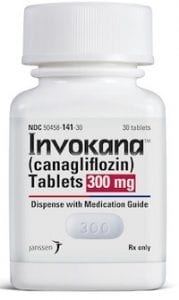 Invokana dangers were seen early on by researchers. FDA reviewers were divided over the safety and effectiveness of Invokana before approving it for the market in 2013. At that time, the agency acted against the advice of prominent physicians and researchers in approving the drug for the treatment of Type-2 Diabetes. Since then, Invokana label warnings have been adjusted twice, so far, to reflect Invokana’s dangers.
Invokana dangers were seen early on by researchers. FDA reviewers were divided over the safety and effectiveness of Invokana before approving it for the market in 2013. At that time, the agency acted against the advice of prominent physicians and researchers in approving the drug for the treatment of Type-2 Diabetes. Since then, Invokana label warnings have been adjusted twice, so far, to reflect Invokana’s dangers.Invokana Warnings
The Invokana label was first updated in 2015 to reflect Invokana’s propensity to increase the risk of ketoacidosis and possibly heart attacks.
What is (Diabetic) Ketoacidosis?
Diabetic ketoacidosis (DKA) is a dangerous rise in blood acidity. This life-threatening condition develops when the body’s cells can’t get the sugar (glucose) they need for energy due to insulin shortage. When sugar can’t enter cells, it stays in the blood. The kidneys filter some of the sugar from the blood and remove it from the body through urine. When cells cannot receive sugar for energy, the body starts to break down fat and muscle for it. This process causes ketones – or fatty acids – to form and enter the bloodstream. This triggers a chemical imbalance (metabolic acidosis) called diabetic ketoacidosis, which can cause coma and even death.
Invokana Heart Attack Links
Another apparent problem with Invokana is its link to heart attacks (myocardial infarction) of which both the drug’s maker – Janssen (of Johnson & Johnson) – and the FDA were aware.
FDA Invokana Fail
A January 2013 meeting occurred between the FDA Endocrinologic and Metabolic Drugs Advisory Committee (EMDA) and representatives of Janssen Pharmaceuticals (drug maker Mitsubishi Tanabe’s U.S. marketing partner). Janssen gave several presentations on the growth of Type 2 diabetes among the population and pushed the need for effective treatments (of the patent medicine, chemical kind, of course). The drug maker also promoted the wonders of its latest product, Invokana. During the question-and-answer session which followed, Dr. Sidney Wolfe – co-founder and director of Public Citizen’s Health Research Group – raised several questions. He pointed out that Janssen’s request for FDA approval was “based solely on surrogate efficacy of HbA1c lowering.” This is a measure of how well a patient’s blood sugar is controlled.
Invokana Dangers seen Early
Dr. Sidney Wolfe said that as with all recently approved Type 2 diabetic drugs, there was no evidence of any improved clinical outcomes, contrary to an older diabetes drug such as metformin. He said that this “surrogate efficacy needs to be balanced against a number of serious safety signals” seen in the clinical trials.
Dr. Wolfe’s primary concern was “thrombotic events” (blood clots) that could lead to heart attacks. He pointed out that in the studies presented, thirteen people on Invokana suffered “cardiovascular events.” Using available data from a related drug of the gliflozin class, Farxiga (dapagliflozin), Dr. Wolfe demonstrated that the risks for Invokana heart attack would be significantly greater: He said, “There is much more of an increase in hematocrit in the people getting canagliflozin [Invokana], 1.5 times as much as the dapa [gliflozin] group.”
Hematocrit refers to the concentration of red blood cells, which is increased by gliflozin drug’s mechanism of action. Normal concentration is 40% for women and 45% for men. Levels higher than that increase the likelihood that a person will develop a blood clot, causing a stroke or heart attack. According to Dr. Wolfe, at least 25% of patients on Invokana would wind up with a red blood cell concentration of 47%, which he described as “a very dangerous range.”
Additionally, FDA Reviewer Dr. Hyon Kwon testified at the committee hearing that there was “an imbalance in early cardiovascular events” observed in the CANVAS trial, a 4,300-subject study assessing the cardiovascular effects of Invokana. When FDA Biostatistician Dr. Mat Soukop testified, it became apparent how profound this “imbalance” is. Dr. Soukop testified that, in the first 30 days of use, Invokana had a cardiovascular events “Hazard Ratio” of 6.9; that is, patients who were taking Invokana had a 690% higher likelihood of suffering a cardiovascular event than the patients who were taking a placebo.
With Dr. Wolfe’s expert testimony and the FDA’s own biostatistical analysis, one might assume Janssen and Mitsubishi Tanabe would have been ordered to conduct more studies before FDA would approve the drug to be administered to patients in the United States. The FDA, by contrast, gave approval for sales of Invokana, on the condition that Janssen monitor it for adverse events. The company was also ordered to conduct a “post-market” double-blind study to determine how many patients actually experienced Invokana heart attacks. The FDA gave Johnson & Johnson’s subsidiary four years to do so.
FDA Ignores Physician/Researcher’s Analysis
The official position of the FDA is that such decisions are based on analyses of risks versus benefits. But FDA simply ignored the advice of prominent physicians and researchers who clearly showed that Invokana offered “no evidence of any improved clinical outcomes.”
RELATED
- Invokana Lawsuit Attorney

by Matthews & Associates




